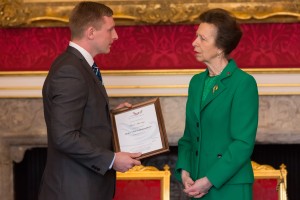PAUL MURRAY (HMP Liverpool)

PAUL MURRAY (HMP Liverpool)
COMMENDEE 2014-15: Paul, an Officer at HMP Liverpool, earns a Commendation for his work in addressing gang violence: researching and developing a range of tools and partnerships to combat the problem both inside and outside the prison.
Paul Murray’s work at HMP Liverpool addresses gang violence – a serious and complex problem on Merseyside – with an impressive combination of intelligence, outreach and partnerships. He uses a range of tools that he has researched and developed in his own time, which he is now seeking to validate for wider use in the Prison Service. The impact of his work was acknowledged in a recent HMIP unannounced inspection.
Currently working as the Violence Reduction Coordinator at Liverpool, Paul’s commitment to tackling violence dates to his initial posting on a wing housing the Segregation Unit. Building on his interest and engagement in challenging violence, he developed a variety of methods to highlight the impact of violence among gang members and others.
Seeking other authoritative voices to bring home the effects of violence, Paul identified and brought a range of guest speakers into the prison. Examples include Rob Jackson, a clinician at the Royal Liverpool Hospital, who achieved national recognition of his work with Liverpool’s youth offending service graphically detailing the actual impact of knife crime – from the perspective of someone who has treated many of its victims.
Another high profile speaker who made an impact on Paul’s course was Paula Ogunboro, a co-founder of Mothers Against Guns, who lost her son to gun crime. Building on their participation, Paul’s work has evolved to include poems, video interviews and life stories. Paula took part in two workshops for 45 prisoners, and as Paul noted, “I was actually surprised at how much it affected the prisoners.”
Other interventions Paul has developed in his own time include a workbook, designed to be worked through by prisoners over a seven day period, in which they consider a range of anti-social behaviour scenarios and give their point of view on how they might react in similar circumstances. Paul went a stage further, creating a peer prisoner support network to help those with literacy or other learning difficulties.
A further advantage of the interventions Paul has created is that they can provide early warning indicators and thus highlight further interventions to help reduce violence. Paul’s work – which began with exploring individual incidents with prisoners – now includes sharing insights with a wide range of partners in the community from which the gang crime originates.
The flexibility and adaptability of Paul’s approach is apparent in other ways, too. These include running focus groups for prisoners to identify and unpack further issues that would benefit from further exploration. As Governor John Illingworth notes, it’s “innovative, practical and well-received” work on all levels, from his personal passion to excellent reports helping inform decision-making at senior levels. “Paul Murray,” he continues, “has made a real difference at Liverpool.”
Paul’s ambitions for his work extend beyond the prison walls, too. He’s exploring the potential for initiatives in which ex-prisoners could help others outside prison. He continues to share the good practice he has developed by working with and training other officers.
It’s inspiring that Paul has been able to pick up on the passion for this approach among prisoners, some of whom he has trained to help him. Many prisoners have asked if they can contribute, too. Here’s Paul again, “This original work from prisoners has been the most effective material, and again I was surprised how effective this appears to be.” Paul’s approach runs from identifying members and specific problems that might flare into violence at induction to considering how to make young males think twice before they join a gang. “It’s my ambition,” he says, “to reduce the number of children who become embroiled in gang culture and embarking on a life they will struggle to achieve. This will make communities safer.”
Much of Paul’s expertise and knowledge has been developed in his own time, at nil cost to the prison, which is itself a mark of the outstanding commitment he’s made to important work that can have lifelong and catastrophic consequences for offenders, victims, family and friends, as well as the wider community.
